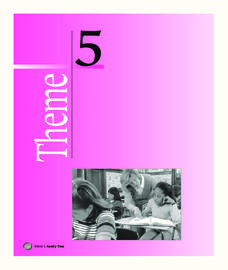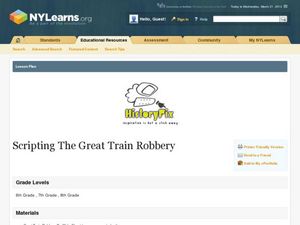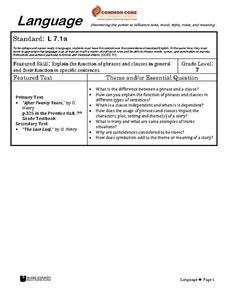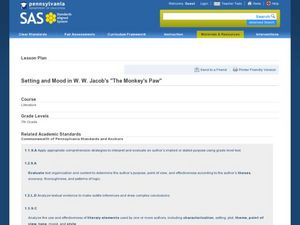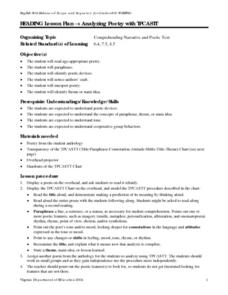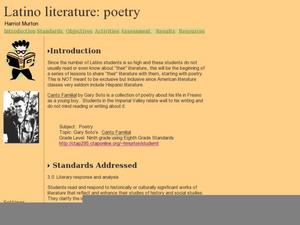Huntington Library
Light in Painting
How do painters use and manipulate light in their artwork to give emphasis and establish mood and emotion? Pupils will analyze a few examples of landscape and portrait painting in order to explore the how light is used in art,...
Curated OER
The Study of Theme and Figurative Language in Poetry and/or Prose
Identify and analyze the use of figurative language used in select pieces of writing. These pieces of literature will represent at least two pieces by one writer and at least two pieces by different writers. This lesson would be a great...
Curated OER
Oliver Twist Goes to Hollywood
How does Oliver Twist, the novel written by Charles Dickens, compare with its screenplay adaptation? Although the activity doesn't require learners to have read the novel, the similarities and differences of the highlighted passages...
Houghton Mifflin Harcourt
Family Time: English Language Development Lessons (Theme 5)
Support English language development with a family-themed unit consisting of a series of lessons designed to get your scholars moving, looking, speaking, writing, and listening. Conversation topics...
Curated OER
Scripting The Great Train Robbery
Take writing prompts to another level in this activity, which allows pupils to create scenes of dialogue based on the 1903 silent film, The Great Train Robbery. Useful for a language arts/history cross-curricular activity, the lesson...
Curated OER
Elements of Poetry
Prepare your learners to identify figurative language in poetry. Tips for reading poetry and what to look for are listed on these slides. Rhetorical devices are defined and plenty of examples are given.
Wake County Public Schools
Language
Have your class doing everything from reading literature, analyzing literary devices, identifying independent and dependent clauses, discussing, and writing creatively with the rich resource found here. After a mini lesson on independent...
Shmoop
ELA.CCSS.ELA-Literacy.RL.11-12.3
Identifying an author’s choice, especially choices that concern craft and literary devices, is a difficult skill to teach. Here's an activity that will make your job easier. The resource breaks down how to teach the skill to novice,...
Reading Resource
/oo/ Word List
Choose a flute of cool fruit today. The /oo/ sound is featured in this activity designed to help kids develop the conscious awareness of the sound structure of words. After identifying and highlighting the /oo/ sound in a list of 39...
Brigham Young University
Introducing the Text and Learning the Process of Script Analysis
Where do directors and set designers get their ideas so that the set they build creates the mood and atmosphere the director wants for a production? From the script! Introduce theater high schoolers to the script analysis techniques used...
Curated OER
Mood In Art And Poetry
Seventh graders investigate the concept of mood and how it influences various types of art. They create an abstract painting and demonstrate how mood is present in the work. Also, 7th graders construct poems using word choices to set...
Curated OER
Emotions Word and Picture Matching
In this emotions word/picture matching worksheet, students analyze 7 pictures that show different moods. Students match these to the word that describes each one.
Curated OER
Language Conventions: Elements of a Good Log Entry
Students use writing logs to achieve clear and creative thinking about the story they are reading. They then describe changes in mood that happened in the story consider why such changes usually occur.
Curated OER
The Importance Setting and Mood in Fiction
Seventh graders examine the setting in pieces of fiction. In this story analysis lesson, 7th graders investigate the setting in fictional stories and the importance it has. Students discover new vocabulary terms applying to...
Macmillan Education
Understanding Poetry
William Wordsworth's "Daffodils" provides young poets with an opportunity to examine how a poet can use powerful images and poetic devices to create vivid pictures in the minds of readers.
Curated OER
Poetic Justice: Understanding the Life of a Tethered Dog
The Humane Society provides a lesson in which class members explore the issue of tethering dogs. Through the resources used -- a comic, a poem, and narrative and expository writings -- class members realize that messages can be conveyed...
EBSCO Industries
Music and Poetry
Song lyrics, like poems, are meant to be heard. After examining the literary devices in several poems, scholars examine the lyrics of popular songs and identify the sound devices and the figurative language writers use to create the...
Curated OER
Analyzing Poetry with TPCASTT
Middle schoolers read a poem and complete a TPCASTT chart. They make a prediction about the title (T) , paraphrase each line (P), identify poetic devices and nuances (C-connotation), explore mood and tone (A-attitude), point out shifts...
Curated OER
How Do you Feel?
Students discover how moods and perceptions can be affected by colors. As a class, they create their own color wheel and identify primary and secondary colors. They draw their own cool and warm color mosaic and discuss how each one of...
Curated OER
Green Light
How is music like reading? First, listeners rank music from slowest to fastest. How does the music's pace affect your mood? How does this same theory compare to reading? Spark a discussion to identify the similarities.
Curated OER
Understanding Fantasy
Explore fantasy as a genre. After working in small groups to identify literary elements in The Lion, the Witch, and the Wardrobe by C.S. Lewis, class members share their work and then use the presentations to help them prepare to write...
Curated OER
Latino Literature: Poetry
Under construction, this lesson focuses on Canto Familia, a collection of poetry about Gary Soto's experiences growing up in California's Imperial Valley. Representative of the experiences of many Latinos, the poems also address themes...
Curated OER
Active and Passive Voice: Finding Examples Online
Incorporate technological fluency with a search for examples of active and passive voice in online resources. Discuss how use of active or passive voice influences mood or tone and contributes to author's purpose. List of...
Curated OER
What are the Elements of Poetry
Young scholars read the poem "Ode to Pablo's Tennis Shoes" and analyze the form, figurative language, and mood. They complete a T-chart containing what they have learned about Pablo and the evidence from the poem supporting their...
Other popular searches
- Identifying Mood and Tone
- Identifying Mood in Reading
- Identifying Mood Tone
- Identifying Mood in Poetry
- Identifying Mood in Passages
- Identifying Mood Worksheet
- Identifying Mood Inpoetry





